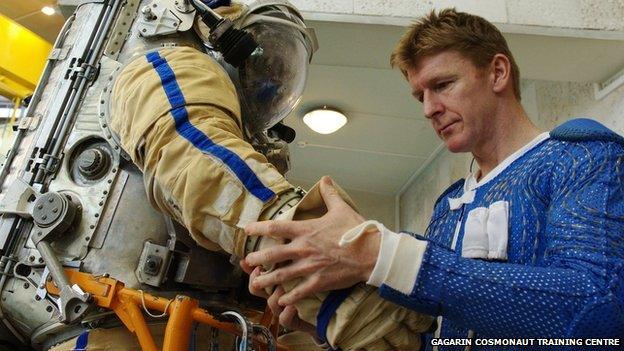Space travel vital to our survival, says UK astronaut
- Published
- comments
The BBC's Pallab Ghosh speaks to British astronaut Tim Peake as he trains underwater to prepare for working in zero gravity.
The British astronaut who is set to go into space next year has said that learning how to live and work in space will be essential to the survival of our species.
He is due to spend six months on the International Space Station next year.
Major Peake is currently undergoing intensive training in Germany to prepare for the mission.
He will travel on a Soyuz rocket from Baikonur Cosmodrome in Kazakhstan and could eat a meal chosen by the public.
"Whether it's an asteroid mission or a Moon mission, the ultimate aim is the future exploration of the Solar System and to get to Mars on a manned mission," he told BBC News.
"Humanity's aim is to explore the Solar System, not just for the sake of exploration. I genuinely believe it is for the sake of our own survival in the future."
Tim Peake will be going to the ISS in November or December next year. He is currently undergoing intensive training at the European Astronaut Centre in Cologne where I caught up with him.
I have met Neil Armstrong, Buzz Aldrin and Chris Hadfield and I wondered how Tim Peake would compare. He came across as incredibly nice and refreshingly normal.
It is because of this that the nation is likely to empathise with him and through his eyes we will witness the wonders of a mission to the International Space Station.
But beneath his easy manner is an ice-cool nerve. It was demonstrated most clearly on the day that his mission was announced.
He was quizzed on Newsnight about the value of his mission by Jeremy Paxman. Very few have matched the formidable presenter when he has been in full cry. But Tim Peake handled the grilling with aplomb.
"I was tired before the interview, which I think helped, because it meant I didn't have the energy to get wound up," he confided modestly.
Reaching out
I asked Tim whether he would be reaching out to people on the ground and inspiring them as Chris Hadfield had done when he was on the ISS.
"I certainly hope that the mission will have an inspirational effect. But I'll be doing it my way," he told me.
British astronaut Tim Peake shows the BBC's Pallab Ghosh around a detailed mock-up of the International Space Station's science lab
He wants the nation to be part of his ground control team.
"We are going to get the public involved in naming the mission, designing the (badge) for the mission and doing things like designing a meal for an astronaut for a day that will get cooked and sent up for me to eat," he said.
The idea behind the meal for Tim is to get people thinking about science through nutrition, minerals and calorific content.
There will be activities involving sport and exercise, too.
I met Tim at the European Astronaut Centre in Cologne.
It is located in the outskirts of the city, in the midst of a desolate industrial complex that seemed to be fading into the grey German drizzle.
The misery of the landscape is blasted away though by the incredible sense of optimism one feels on entering the astronaut training centre. Its vast hall seems like an untidy giant's playroom, strewn with life-sized replicas of parts of the ISS.
Tim grinned at my bemusement and showed me through to where he'll be working - a true-to-life representation of the Columbus module, which is Europe's laboratory in space.
Here, he is taught how to take apart a smoke detector and change its filter. Routine maintenance will be a large part of his job.
Only the brave

Tim Peake: "Humanity's aim is to explore the Solar System for the sake of our survival"
"There's lots of unglamorous work to do. At times, we are plumbers; at times, we're electricians. We do all sorts of jobs," he said.
There was a time when all you needed to be an astronaut was to be very brave. Now you need to be able to do much more.
The former helicopter pilot is also learning how to be a scientist. It is hoped that he will be carrying a number of British-led experiments that would include watching how microbes grow in space and creating new types of metal alloys in zero gravity.
The ISS is now the orbiting laboratory it was designed to be but many leading researchers say that the projects that will be undertaken on board won't be cutting edge.
"It is definitely cutting-edge science," Tim protested. "Some of the things we are doing on the space station are absolutely remarkable. We are finding things about our bodies that we genuinely had no ideas about before."
The most interesting experiments on board the space station are the astronauts themselves. They are being constantly monitored to investigate the effects of long-term space travel.
Currently, astronauts normally don't spend more than six months on the ISS because of exposure to radiation and bone loss caused by weightlessness.
It is the debilitating effects of long-duration space missions that is one of the main obstacles to sending humans to Mars.
But, speaking candidly, Tim told me that among the astronaut corps, there was a firm belief that one among their number would, in the not-too-distant future, journey to another world.
"We are being trained for these kinds of missions on the new launch systems," he said. "It's easy to dismiss this stuff about 'Moon, Mars and Beyond' as Nasa propaganda. But they are taking it seriously and I think it really will happen."
Follow Pallab on Twitter, external
- Published24 January 2014
- Published20 May 2013
- Published13 May 2013